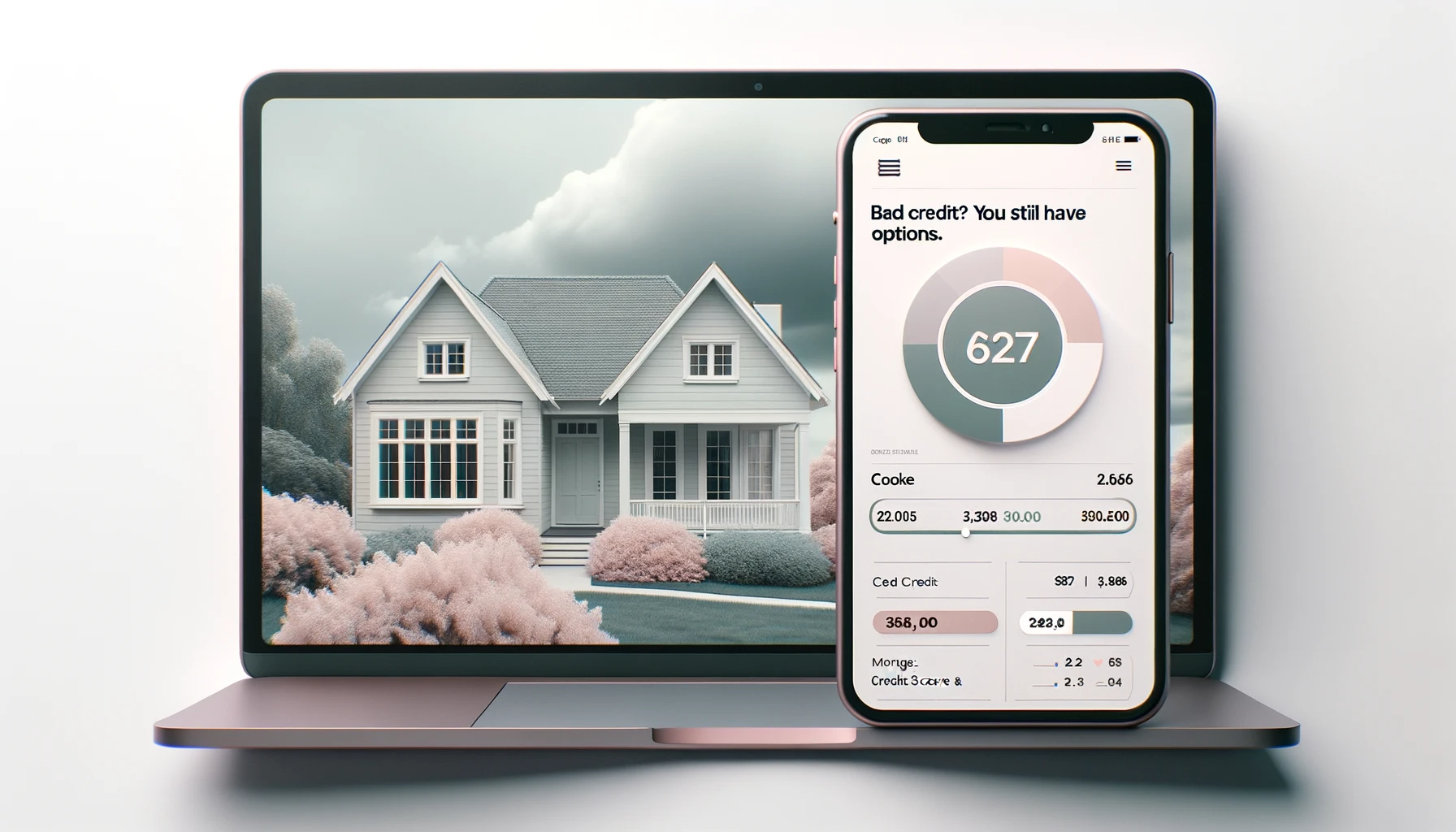- What Does a Bad Credit Mortgage Calculator Do?
- Essential Information for Using a Bad Credit Mortgage Calculator
- Your Mortgage Borrowing Capacity with Bad Credit
- Digging Deeper: More on Mortgages with Bad Credit
- How to Improve Your Credit Score for Better Mortgage Rates
- Why Mortgage Adviser is Still Essential
- The Bottom Line
Crunch the Numbers: Bad Credit Mortgage Calculator

Having a bad credit history can seem like a significant roadblock when it comes to getting a mortgage in the UK.
You might find yourself worried about your mortgage eligibility, or feel uncertainty about your chances. But, even with bad credit, owning a home isn’t out of reach.
This is where tools such as a bad credit mortgage calculator come into play. You can use our calculator to find out how much you may borrow.
What Does a Bad Credit Mortgage Calculator Do?
A bad credit mortgage calculator is a simple-to-use tool that offers insights for individuals with a poor credit history.
It indicates the amount you might be able to borrow and the kind of interest rates you could face, given your credit background.
Here’s how it works:
- Enter your income, desired property value, and how much you intend to borrow. Accuracy here gets you closer to real-world figures.
- Share your credit history. It’s crucial to be upfront for accurate results.
- The calculator will then evaluate your data, giving a snapshot of your mortgage prospects.
Be aware that these calculators cannot guarantee approval or an exact borrowing amount. They are only a general guide. But, they are a good starting point for understanding your options.
To get a comprehensive analysis of your mortgage eligibility and borrowing potential, it is advisable to consult a good mortgage adviser. They can provide expert insights and advice tailored to your unique circumstances.
Essential Information for Using a Bad Credit Mortgage Calculator
Using a bad credit mortgage calculator is straightforward. But to get the most accurate results, you need to provide certain pieces of information:
- Property Valuation or Purchase Price – The market value or buying price.
- Desired Loan Amount – How much you intend to borrow.
- Annual Income – This dictates your repayment ability.
- Credit History – Past and present credit activities.
- Credit Score – Scores vary across UK credit agencies but are crucial for evaluation.
The more thorough and honest you are, the clearer the picture of your mortgage prospects.
Your Mortgage Borrowing Capacity with Bad Credit
Understanding your borrowing capacity with a poor credit history is crucial for planning your home-buying process. This is where our dual-functionality mortgage calculator can assist.
Not only does it give you a sense of your mortgage approval chances, but it also provides an estimate of how much you might be able to borrow.
When you input your information, our calculator takes into account both your credit history and your income.
With this data, it works out a rough estimate of your borrowing capacity, giving you a better idea of what properties might be within your reach. But, these figures should serve as a starting point and not a definitive answer.
Digging Deeper: More on Mortgages with Bad Credit
What is a Bad Credit Mortgage?
A bad credit mortgage is a kind of mortgage that’s accessible to people who have had credit issues in the past.
If you’ve failed to make payments on time, defaulted on a loan, or faced county court judgements (CCJs), you’re likely to have a lower credit score.
This doesn’t mean you can’t get a mortgage. But it may limit your options, which is where a bad credit mortgage comes into play.
What is Your Credit Score and Why Does it Matter?
Your credit score is a numerical representation of your creditworthiness, calculated based on your credit history.
Importance of credit score
Your credit score is a critical factor lenders consider when determining whether to approve your mortgage application. A high credit score can increase your chances of approval and potentially help you secure better interest rates.
Factors influencing your credit score
Here are 5 factors that affect your credit score:
- Payment history – This includes information on your credit card payments, loans, and mortgages, indicating whether you have a track record of timely repayments.
- Current level of debt – This reflects your current financial obligations, including outstanding loans and credit card balances.
- Length of credit history – A longer credit history, assuming responsible credit management, can positively impact your score.
- Types of credit used – Having a diverse mix of credit, such as credit cards, retail accounts, and loans, can be beneficial.
- Credit Checks – Too many hard enquiries on your credit file within a short time can negatively impact your score.
Where Can I Get a Copy of My Credit Report? The Top Agencies
In the UK, three primary credit reference agencies stand out: Experian, Equifax, and TransUnion. Most lenders turn to these agencies for their preliminary credit evaluations.
Another noteworthy platform is CreditKarma, utilising data from both Equifax and TransUnion to formulate their ratings.
So, what exactly do these credit reference agencies do? They gather data on individuals’ borrowing and repayment behaviours and present this data to potential lenders or businesses pondering offering credit.
The goal? To help them determine if the individual is a dependable borrower or poses potential risks.
It’s vital to understand that these agencies only provide the data; they don’t decide on its implications.
The data they store can be divided into two main types: credit account information and public information.
Credit Account Information
Sourced from major UK lenders willing to disclose details about their borrowers. This includes information about credit agreements, outstanding amounts, account numbers, and payment history. By sharing this data, lenders aim to mitigate lending to high-risk individuals.
Public Information
Data available in public domains, like the Register for Judgments, Orders & Fines, the Insolvency Register, and the electoral roll. Being on the electoral roll can confirm your identity.
Meanwhile, other registers hold data on County Court Judgments (CCJs), bankruptcies, Individual Voluntary Arrangements (IVAs), and other related financial records.
Bear in mind, records of CCJs, IVAs, and other similar financial mishaps are kept for only six years. After this period, these details should no longer influence your credit score.
If you’re curious about your credit score, it’s wise to obtain a report from the three major agencies. It’s now free and straightforward online.
Review these reports carefully, and if you spot discrepancies or outdated information, contact the respective agency without delay. Adjustments might take a few weeks to reflect.
How to Improve Your Credit Score for Better Mortgage Rates
Improving your credit score can be the key to securing more favourable mortgage rates. Here are a few straightforward steps you can take:
- Pay your bills on time – Consistent, timely payments help build a strong credit history, indicating to lenders that you’re reliable.
- Limit your use of credit – Try not to use more than 30% of your total credit limit across all your credit accounts. High credit utilisation can lower your credit score.
- Don’t apply for credit too frequently – Each application results in a credit check, which can slightly lower your score. Space out your applications whenever possible.
- Check your credit report regularly – Ensure your credit report is free from errors. If you notice something wrong, contact the relevant credit reference agency to rectify it.
- Register on the electoral roll – This can provide a slight boost to your credit score as it verifies your current address and helps lenders confirm your identity.
Read more in our How to Improve Mortgage Credit Score Guide.
Why Mortgage Adviser is Still Essential
A bad credit mortgage calculator is a useful tool to gauge your borrowing power and mortgage prospects. However, it is not a substitute for expert advice from a professional mortgage adviser. Here are some reasons why:
- Personalised analysis – A mortgage adviser can provide a personalised analysis based on their extensive knowledge and understanding of lending criteria. This is something that a calculator cannot replicate.
- Access to a variety of lenders – Mortgage advisers have access to a wide range of lenders, including those not available to the public directly. They can match you with lenders most likely to approve your application.
- Support through the application process – From completing paperwork to dealing with potential issues, an adviser can guide you through the application process, making it smoother and less stressful.
- Ongoing guidance – Buying a house is a significant decision. A good broker can provide ongoing support, ensuring you are informed and comfortable every step of the way.
The Bottom Line
Despite a bumpy credit history, owning a home in the UK can be more than just a dream.
With the right tools, such as our bad credit mortgage calculator, you can assess your mortgage options. This includes understanding your potential borrowing power and the possible repayment rates.
Still, this should serve as a launchpad, not a conclusive end.
To fully understand your mortgage options, you need expert advice tailored to your circumstances.
So, don’t hesitate to contact us. We will connect you with a knowledgeable broker who can guide you towards your homeownership goals.
Get Matched With Your Dream Mortgage Advisor...

Frequently asked questions
How difficult is it to get a mortgage if I'm self-employed with bad credit?
Being self-employed with bad credit makes the mortgage application process more challenging. Lenders often require at least two years of tax returns, and your interest rate is likely to be higher. You may also need a larger down payment to secure the mortgage.
Can I get a mortgage while on a debt management plan?
While challenging, it’s not impossible to get a mortgage on a debt management plan. Lenders will want evidence that you’ve been consistent with your payments and may still require higher interest rates or a larger down payment.
How do Debt Relief Orders affect my chances of getting a mortgage?
Debt Relief Orders (DROs) severely limit your ability to get a mortgage. They will remain on your credit file for a period of time, making it difficult to secure any form of credit, including a mortgage.
Do late payments on my credit history severely affect mortgage applications?
Late payments can impact your mortgage application, but their severity lessens over time if they’re isolated incidents. Consistent late payments are more problematic and could result in loan denial or high-interest rates.
How long after bankruptcy can I apply for a mortgage?
Typically, you need to wait at least 12 months after your bankruptcy is discharged to qualify for a mortgage. Even then, you should expect to face higher interest rates and stricter eligibility criteria.
Do pay day loans affect my eligibility for a mortgage?
Yes, payday loans are generally viewed unfavorably by mortgage lenders and can significantly impact your eligibility and the interest rates you are offered.
Can I get a mortgage if I have no credit history?
Having no credit history makes securing a mortgage challenging, but not impossible. Some lenders offer ‘no credit score’ mortgages but often at less favorable terms, including higher interest rates.
Can I remortgage my home with bad credit?
Yes, you can remortgage with bad credit, but your options will be limited. Expect to face higher interest rates, additional fees, or a higher loan-to-value ratio.




